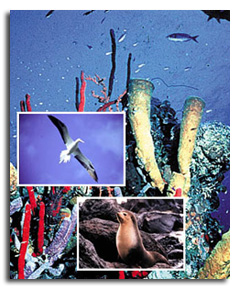 The Royal Naval Birdwatching Society was established in 1946 to help and encourage members serving in the Royal Navy, Royal Marines and Women’s Royal Navy Service, in the observation and study of birds at sea, the RNBWS has widened its membership to include all those interested in Birdwatching who share a common background - the sea itself. Membership (including Associate Members from many countries overseas) averages 250, including many from the Merchant Navies of several countries, ocean weather ships, the offshore oil industry, passengers on cruise liners and yachtsmen. Reports received cover most sea areas of the world.
About seven tenths of the world's surface is covered with salt water, which provides the environment for nearly 300 species of seabirds, and across which many more species of land-bird travel during their annual migrations. Especially during adverse weather, these frequently take refuge on board ships. The problems of their identification and deduction of their seasonal distribution and migration routes, etc., are challenges providing a fascinating hobby for the seafarer, and such observations can be of unique importance to the serious ornithologist and conservationist.
The primary aim of RNBWS is to provide a forum for the exchange of information and observations of seabirds, and of land-birds at sea, by members for whom Birdwatching is first and foremost a hobby, and to provide advice and support to make best use of such opportunities at sea. The secondary aim is to co-ordinate the efforts of individual members using standardised recording methods, so that observations can be of value to the professional ornithologist ashore. RNBWS has close links with many other Organisations and Societies around the world. RNBWS has built up a reporting system using standardised recording forms - passage reports covering both seabirds and land-birds, seabirds census sheets, and for birds examined in the hand. The society has established a number of local representatives, both in home ports and in ports overseas, to provide a focus for Birdwatching activities when in harbour, or ashore.
 |




























